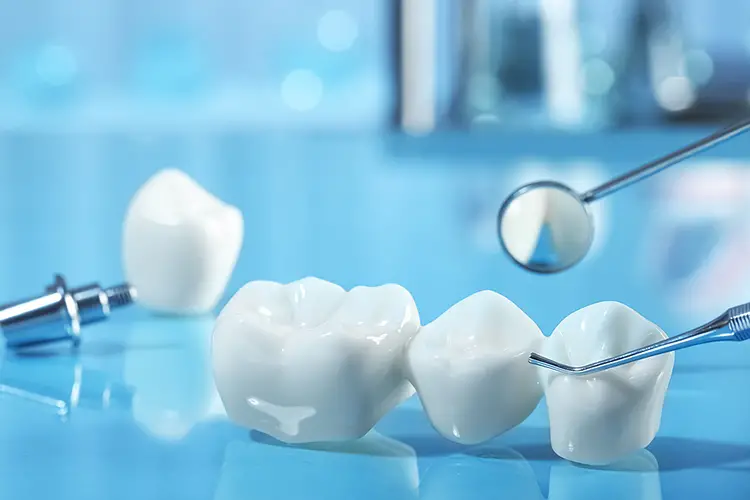Crowns & Bridges in Katy, TX

Dental bridges and crowns are both fixed prosthetic appliances, but they each serve different purposes. The main difference between a crown and a dental bridge is that a crown covers an entire tooth, while a bridge fills in the gap left by a missing tooth. Bridges can be anchored to implant-supported crowns or natural teeth with crowns. Our skilled dentist at Caspian Dental Center can tell you more about the benefits of dental crowns and bridges and which choice is ideal for you.
What Is a Dental Crown?
A dental crown is a cap that is shaped to look like a natural tooth and is usually made of porcelain, porcelain fused to metal, metal, or gold. The crown covers the entire tooth, making it stronger. It can be used to restore a tooth that is cracked, broken, worn down, or discolored. A dental crown can also be used for cosmetic purposes, such as to cover a tooth that is misshapen or discolored.
What Is a Dental Bridge?
A dental bridge is a fixed prosthesis that replaces a tooth or row of teeth. It is held in place by crowns that are attached to prepared healthy teeth on either side of the gap. A dental bridge helps patients maintain their appearance and regain their ability to properly chew and speak.
Advantages of Crowns and Bridges
Protection
A dental crown can restore the functionality of a tooth that has been significantly damaged or decayed. But for patients missing multiple teeth in a row, a dental bridge may be the best restoration option.
Aesthetics
Dental crowns and bridges are both used to restore the appearance of a patient’s smile. Dental crowns are used to restore both broken and decayed teeth while a dental bridge is used to replace one or more missing teeth.
Strength
Dental crowns and bridges are extremely durable. When compared to other restorations such as fillings, crowns and bridges are stronger. That’s because they are custom-fitted and are bonded or cemented into place, making them permanent.
Ease of Use
On top of being durable, dental crowns and bridges are also easy to care for. Just like your natural teeth, they need to be brushed and flossed daily. While crowns and bridges can withstand normal wear and tear, they are not indestructible. Avoid chewing on hard objects such as ice or hard candy, and avoid biting your nails.
Which Is More Durable: The Crown or the Bridge?
When cared for properly, a dental bridge can last for five to 15 years. You will need to replace the bridge once they start to wear down. This can happen due to cavities developing in the teeth that anchor the dental bridge.
Crowns and restorations on dental implants can have a lifespan of up to 20 years. However, this is only possible if patients brush and floss properly, visit the dentist regularly, and avoid grinding their teeth.
Visit Caspian Dental Center at 410 Park Grove Dr., Katy, TX 77450 or call (832) 321-4901 to schedule an appointment to learn more about the benefits of dental crowns and bridges and which option is best for you.
